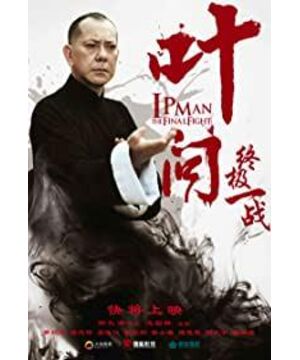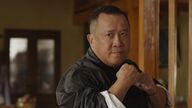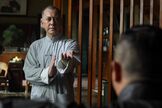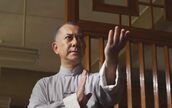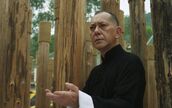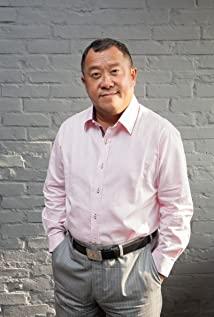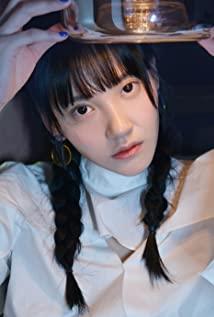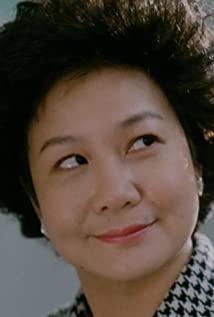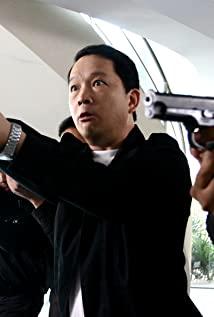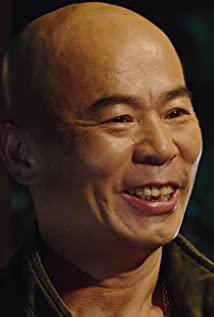So while I was watching, I kept waiting and waiting: Why hasn't the final battle come yet? Finally, when Ye Wen and the Earth Head Dragon fought a less amazing battle, he realized that this battle was just a routine action of the Grandmaster and was not rendered into a common legend.
This seems to be an anti-legendary story.
The film even comically satirizes the legendary approach. The scene is after the street fight between the Wing Chun faction and the Baihe faction. For this reason, the glasses reporter published an article in the Hong Kong citizen newspaper "Wulin": "In an instant, the sky was dark and the sky was dark, and the ghosts were crying. Yemen (the reporter's name), the head of the Wing Chun faction, was very successful, flying over the eaves and walls, as if walking on the ground. The white and blue swords of the White Crane School were broken, and wherever Yemen passed, the grass and trees did not grow, and there were countless disciples of the White Crane School who were severely injured, and they were all overwhelmed." In a street group fight, the quilt used the writing style of the novel, borrowed from the Zhuanzhuzhuzhu, etc. The fiction of the martial arts tradition has become a legendary legend. This text was also expressed in a comic fictional image: Ye Wen Qinggong skipped the eaves and the crowd, and looked at all beings. Contrast with previous real fight scenes. After reading it, the apprentices who had witnessed the incident were amazed: "So exaggerated?" Master Ye Wen turned his back to them and watered the plants. He seemed to be smiling, but did not say a word.
There is also this scene at the beginning of the film: Ye's son sees Bruce Lee teaching martial arts on TV, and shouts "Your apprentice is on TV". The camera gives Ye Wen a back view of watering flowers, but he doesn't say a word. The international superstar and the pride of the Chinese, Bruce Lee, appeared throughout the story, and Ye did not comment, cooperate, or object.
Ip Man in "Ip Man: The Ultimate Battle" is like this: diluted and appropriate, with a firm view inside, acting casually, without any doubts. To use his own famous Tibetan poem for Baihe School Wu Zhong, it is "asking one's self-discipline and self-cultivation".
That's why this film is made up of stories: a legendary environment and plot are set, but the master Ye Wen has used his temperament to "resolve" the drama. The story revolves around the life trajectory of the protagonist and sets three types of people: apprentices, rivals, and women (wives and lovers). It is full of many small conflicts. To his own people, the master uses a very wise and peaceful way to inspire others to make choices and resolve conflicts without showing a trace of turbulence in himself. To the enemy, that is to use a very firm stance and powerful lethality to restrain the opponent and maintain an invincible position.
Since the characters have already been established, the key point of reading this kind of story is to see how a generation of masters showed their unmoving calmness and how to tolerate all kinds of conflicts in the daily events in which ordinary people like you and me made ordinary reactions. And threw the sharp side mercilessly to the unreasonable Scarface. This type, Huang Qiusheng came to play, although there are many differences between the appearance and the prototype, but in terms of acting type, it is quite consistent.
The grandmaster filmed like this, in fact, it has become another kind of legend. An everyday person who can taste and eat all kinds of tea and rice tastes (a film reviewer said that this movie is to shoot the master's meal, meal, meal, that's right, there are many meal scenes in the film), it may also be a key moment that is as majestic as Mount Tai. Grandmaster. Comparing the two, you will be amazed and pondered: Grandmaster ~
After various legendary types of Grandmasters, I now want to see the story of how Grandmasters became Grandmasters. In addition to the power and admiration of future generations, what is the hard truth-the master's "art" and "dao"? I'm afraid story-based popular culture is difficult to handle.
View more about Ip Man: The Final Fight reviews


